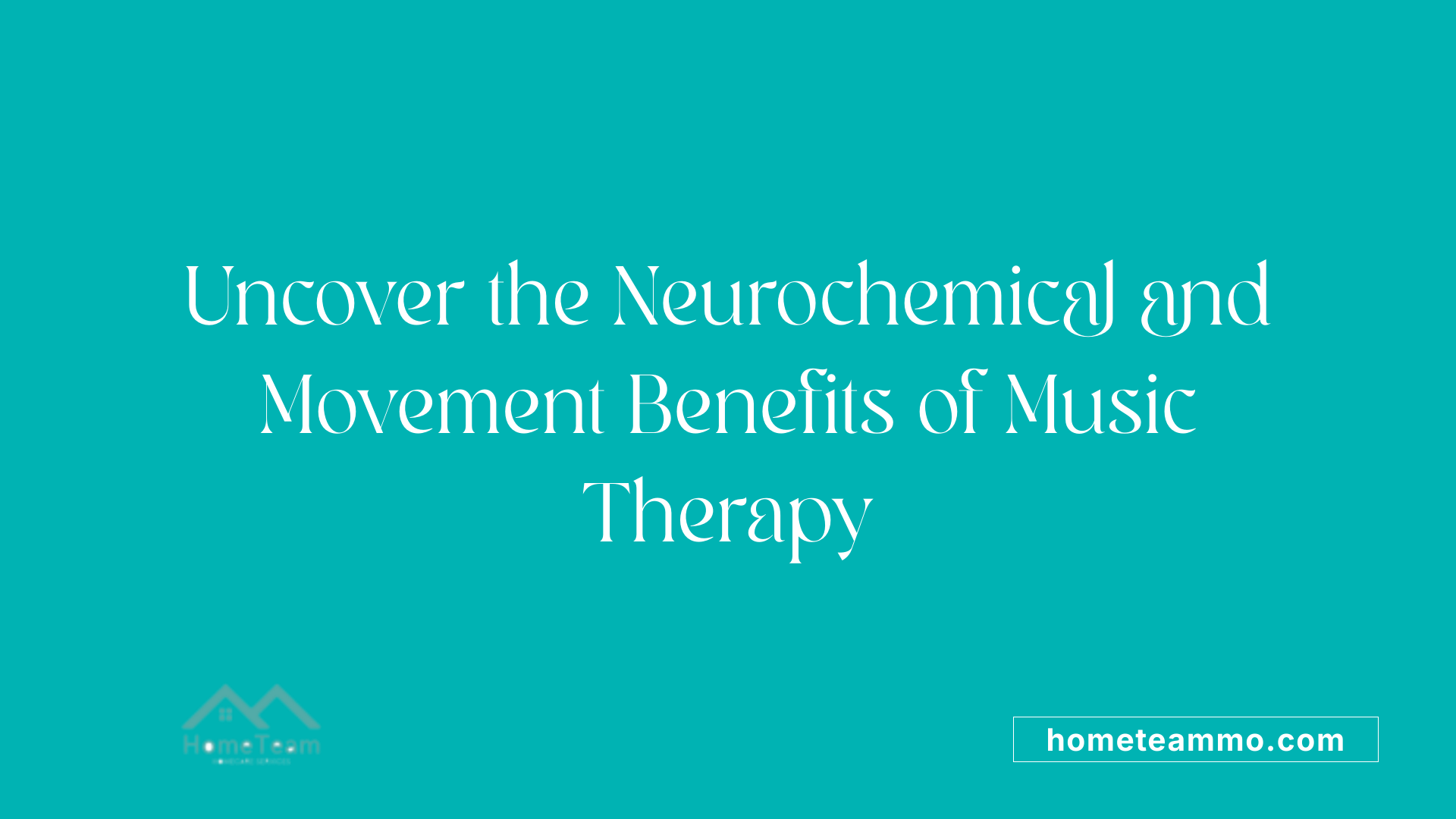The Role of Music Therapy in Enhancing Senior Well-being
Harmony in Aging: The Transformative Power of Music Therapy

Unlocking the Potential of Music for Senior Wellness
Music therapy stands as a dynamic and evidence-based approach to enhancing the physical, emotional, and cognitive well-being of older adults. By harnessing the innate power of music, professionals can deliver personalized interventions that address the complex needs of seniors, fostering a more fulfilling and healthier aging process.
Understanding the Mechanics of Music Therapy in Senior Health

What scientific mechanisms underpin the effects of music therapy on seniors?
Music therapy influences older adults' health through complex neural and physiological pathways. When seniors engage with music, it stimulates multiple brain areas involved in emotion, memory, movement, and cognition.
Listening to familiar songs or participating in musical activities activates neural pathways that support emotional regulation and cognitive functions. This stimulation can help improve memory recall, attention, and mental clarity, especially for those experiencing cognitive decline or dementia.
Moreover, music prompts the release of neurochemicals such as dopamine, endorphins, and serotonin. These substances contribute to mood elevation, stress reduction, and feelings of pleasure and relaxation.
Rhythms and melodies, particularly those that are familiar, play a vital role in supporting physical coordination, motor skills, and balance. These elements are especially beneficial in physical rehabilitation and fall prevention programs.
In addition, the synchronization of movement to rhythmic cues enhances motor control and gait. This is invaluable for seniors with Parkinson’s disease or recovering from injury.
Overall, music therapy acts through a combination of emotional, neurochemical, and sensory pathways. Its ability to activate neuroplasticity and promote social interaction makes it an effective holistic treatment for physical, cognitive, and emotional well-being in the elderly.
Cognitive and Emotional Benefits of Musical Engagement

How does music therapy aid memory recall and cognitive stimulation in seniors?
Music therapy plays a vital role in enhancing memory and cognitive functions among seniors, especially those experiencing cognitive decline or dementia. Engaging with musical activities such as listening to familiar songs, singing, or playing instruments can evoke memories and stimulate neural pathways involved in memory processing.
Research shows that music can access deep-seated memories because it activates multiple brain areas related to movement, emotion, and cognition. For example, playing music or singing familiar tunes helps individuals with Alzheimer’s recall life events and connect with their personal identity. Structured music programs can improve verbal memory, thinking speed, and overall cognitive health over weeks of consistent activity.
Moreover, music-based activities like memorizing lyrics, rhythms, and instructions support focus, attention, and mental agility. This form of stimulation not only helps maintain existing cognitive skills but also may delay further decline, making it a valuable addition to care plans.
How does music therapy contribute to stress reduction and mood improvement?
Music has a powerful emotional impact on seniors. Listening to calming melodies or participating in group singing sessions can significantly reduce stress levels and promote relaxation. Such activities help decrease the production of stress hormones and foster a sense of calm.
Engaging with music elevates mood by stimulating the brain’s limbic system, which is involved in emotion regulation. It can evoke positive memories and feelings, inspiring joy and comfort. This emotional uplift is especially beneficial for seniors dealing with loneliness, depression, or anxiety.
Additionally, music therapy provides an accessible outlet for emotional expression, allowing seniors to share feelings in a non-verbal way. This contributes to overall emotional resilience and well-being.
What role does music therapy play in alleviating depression, anxiety, and agitation?
Music therapy offers a non-pharmacological approach to manage common mental health issues in older adults. Through listening to preferred, meaningful music, seniors can experience relief from symptoms of depression and anxiety. Music activities can create a calming environment, helping to lower agitation and improve emotional stability.
Interacting in group music sessions fosters social connections, reduces feelings of isolation, and promotes community engagement. These interactions are crucial in alleviating loneliness, a common concern among the elderly.
In cases of dementia and Alzheimer’s, music acts as a memory trigger and stress reducer. Playing familiar tunes can calm agitation, decrease stress hormone levels, and offer a sense of familiarity and safety.
Overall, music therapy supports mental health by providing relaxation, enhancing mood, and creating opportunities for social bonding, all of which contribute to a better quality of life for seniors.
Fostering Social Connections and Emotional Resilience
 Music therapy offers many pathways to improve the social and emotional well-being of seniors. Group activities such as singing, dancing, and playing instruments serve as vibrant platforms for building community and fostering a sense of belonging.
Music therapy offers many pathways to improve the social and emotional well-being of seniors. Group activities such as singing, dancing, and playing instruments serve as vibrant platforms for building community and fostering a sense of belonging.
Participating in collective music-making helps seniors reduce feelings of loneliness and social isolation. For example, choir singing or group drumming sessions encourage face-to-face interaction, promote teamwork, and strengthen social bonds.
These activities also support emotional expression and help seniors maintain their sense of identity. Engaging music activities provide opportunities for personal creativity—whether through improvisation, songwriting, or exploring new genres—fostering a sense of purpose and fulfillment.
Music therapy’s capacity to enhance quality of life stems from its ability to connect emotionally, stimulate memories, and elicit positive mood states. It plays a vital role in managing emotional challenges like depression and anxiety while also encouraging interaction within communities.
Overall, integrating music therapy into senior care not only boosts social engagement but also nurtures emotional resilience, making everyday life more joyful and meaningful.
Practical Strategies and Applications in Elderly Care

What practical strategies and applications of music therapy in elderly care?
Implementing music therapy in senior care involves a variety of personalized and group activities tailored to support physical, emotional, and cognitive health. One effective approach is conducting individual sessions that include listening to music, singing, playing instruments, and dance. These activities are customized based on the senior’s musical preferences, cultural background, and specific needs, making the experience both meaningful and engaging.
Group activities play a vital role in fostering social connections and physical activity among seniors. Examples include group singing, drum circles, and choreographed dancing. Such activities not only help reduce feelings of loneliness but also promote coordination, balance, and teamwork, contributing to overall well-being.
Incorporating familiar music from seniors' youth or personal playlists can evoke cherished memories, reinforce identity, and improve communication—even for those with dementia or cognitive decline. Using music that resonates culturally or personally helps deepen emotional responses and create a calming, supportive environment.
Evidence-based applications led by trained, certified music therapists are essential for achieving the best outcomes. These professionals design programs aiming to reduce anxiety, agitation, and stress while enhancing mood and cognitive function. For instance, music therapy can be used to address depression, chronic pain, or cognitive deterioration in an accessible, cost-effective way.
A practical strategy involves balancing active participation—such as singing or instrument playing—with receptive listening sessions. Both methods serve different therapeutic purposes but together offer a comprehensive approach to improve quality of life.
By integrating these strategies into routine care, facilities can create an enriching environment where seniors gain physical strength, emotional resilience, and social engagement. This holistic integration helps foster independence and mental clarity, ultimately supporting healthier aging.
In summary, personalized music sessions, engaging group activities, and the use of familiar or culturally relevant music form the backbone of effective elderly care programs. These approaches harness the universal appeal of music to promote health, happiness, and a sense of community among older adults.
For further exploration, searching phrases like "practical applications of music therapy for elderly" can yield detailed guides and resources on integrating music therapy into various care settings.
Music Therapy in Rehabilitation and Health Promotion
How can music therapy support movement and motor skills during rehabilitation?
Music therapy plays a significant role in helping older adults regain and maintain physical movement and coordination. Rhythmic activities such as drumming, dancing, and movement-based exercises not only promote physical activity but also improve balance, muscle strength, and cardiovascular health. Engaging in these activities enhances motor skills and can reduce the risk of falls. Research shows that music-assisted physical exercises encourage seniors to move more actively, fostering better mobility and overall physical resilience.
How does music therapy contribute to reducing pain and promoting relaxation?
Music therapy helps in pain management by acting as a distraction and reducing the perception of pain. Calming melodies and music interventions like Music-Assisted Relaxation (MAR) guide seniors into deep relaxation, reducing muscle tension and stress hormones. These techniques improve breathing, ease discomfort, and create a sense of calm. The psychophysiological effects of music support relaxation, making it an effective non-pharmacological approach for pain relief, especially in chronic pain conditions.
How can music therapy delay cognitive decline and support chronic disease management?
In terms of cognitive health, music therapy stimulates neural pathways involved in memory, attention, and processing speed. Structured programs that utilize familiar music can trigger memories and improve mental alertness in seniors with dementia or Alzheimer’s disease. Regular engagement with music activities has been linked to slowed cognitive decline and enhanced brain plasticity.
Furthermore, music therapy supports the management of chronic illnesses like Parkinson’s disease and cardiovascular problems by encouraging movement, improving overall physical health, and reducing symptoms such as depression and anxiety. Group music interventions foster social connections, vital for emotional well-being and compliance with treatment plans.
| Application Area | Benefits | Methods Used |
|---|---|---|
| Movement & Motor Skills | Improved balance, coordination, mobility | Dancing, drumming, rhythmic exercises |
| Pain Management | Reduced perception of pain, relaxation | Music-assisted relaxation, calming melodies |
| Cognitive & Emotional Healthcare | Delayed cognitive decline, mental health improvement | Listening to familiar music, singing, songwriting |
Music therapy’s versatile approach makes it a valuable tool in senior rehabilitation and health promotion, addressing diverse physical and mental health needs through engaging, enjoyable activities.
Emerging Trends and the Future of Music Therapy in Senior Care
How can music therapy be used in future health promotion for seniors?
By 2025, music therapy is expected to become an even more integral part of health promotion for older adults. Innovative approaches include integrating music therapy into rehabilitation programs using personalized playlists, virtual reality platforms, and digital applications. These tools help tailor experiences to individual preferences, cultural backgrounds, and physical or cognitive abilities.
The adoption of virtual and augmented reality offers immersive environments where seniors can engage with music meaningfully, promoting physical activity, cognitive stimulation, and emotional well-being. Intergenerational programs are growing in popularity, fostering connections between seniors and younger generations through shared musical activities like singing, songwriting, and collaborative performances.
Community involvement is also expanding options for seniors, making music therapy beneficial in diverse settings such as senior centers, assisted living facilities, and home-based care. These technological and social innovations make music therapy more accessible, engaging, and adaptable, ensuring it continues to support holistic health by addressing physical, mental, and emotional needs.
| Future Trends | Description | Benefits |
|---|---|---|
| Digital Platforms | Use of apps, playlists, and online sessions tailored to individual preferences | Increased accessibility, personalized therapy, convenience |
| Virtual Reality | Immersive experiences for relaxation, movement, and memory recall | Enhanced engagement, multi-sensory stimulation |
| Intergenerational Programs | Cross-age musical activities fostering social bonds | Reduces loneliness, builds community |
| Community-Based Initiatives | Programs in local settings promoting broad access | Greater inclusion, social integration |
Advancing these technologies and programs ensures that music therapy remains a versatile tool for improving health, fostering social bonds, and enhancing the overall quality of life for seniors.
Harnessing Harmonic Healing for a Better Aging Experience
Music therapy’s proven efficacy across physical, emotional, and cognitive domains underscores its essential role in elder care. Its adaptability, combined with technological advancements, promises a future where personalized, accessible, and holistic interventions support seniors' wellness. By embracing music’s universal language, caregivers and health professionals can foster resilience, joy, and a better quality of life as individuals age.
References
- Music Therapy for Seniors: Enhancing Well-being Through Melodies
- Can Music Therapy Improve the Quality of Life of Institutionalized ...
- Health Benefits of Music Therapy for Older Adults - WebMD
- The Role of Music Therapy in Senior Happiness
- How music therapy helps older adults | UCLA Health
- The Role of Music Therapy in Senior Rehabilitation - A.G. Rhodes
- The Many Benefits of Music Therapy for Seniors

How In-Home Care Services Help with Bathing and Grooming

Dusting and Vacuuming: Keeping the Home Allergen-Free

Why Local CDS Providers Are Vital for Community Support

How In-Home Care Services Help Seniors with Speech Impairments

The Importance of Regular Health Monitoring in In-Home Care

